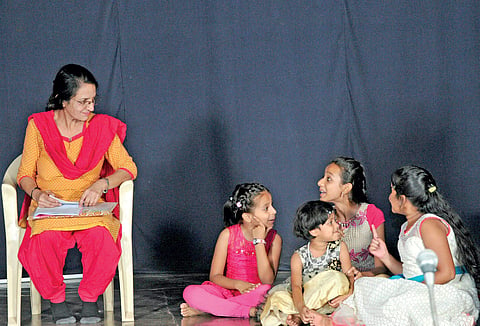

MYSURU: There is pin-drop silence in the hall. Students watch in rapt attention a skit focusing on the sleep-walking scene from ‘Macbeth’. Immediately follows another short play throwing light on disorders like ‘Florence Nightingale Effect’ (Tender is the Night). Follow more skits on other mental issues — the programme stretching over even two hours sometimes.
All in simple English so students can understand these short plays and know all about empathy.
How common is it for an English teacher to use theatre like this as a medium of education? Quite common, you may say. Well, not so, when the teacher happens to be Dr R Purnima, who integrates English literature with stagecraft to sensitise her students towards mental health issues.Purnima, a retired English professor from the Karnataka State Open University, Mysuru, teaches the basics of the language to children of government schools through plays, while also using theatre as a tool to spread awareness about psychological and psychiatric issues.
Her latest play, titled ‘Stage Chemistry: Neuro-Psychiatric Disorders on Stage’, features her as an actor, and has also been scripted, produced and directed by her. The play, which has been staged over 80 times in the past five months, aims to make the target group understand and promote mental health, as also to help those affected achieve catharsis so that the world becomes a better place for them to live in. It also encourages students to develop the habit ofreading.
“When I started getting acquainted with the disorders and attempting to connect the same to literature and develop the script, I never ever thought that this would be staged these many times. Even after 70 shows, it is still being staged,” says Purnima, who has received several honours, including the Fulbright-Nehru Senior Research Fellowship.
The sexagenarian teacher has organised several theatre workshops in Kannada and English for students and teachers of schools and colleges. Whenever the opportunity arises, she encourages them to act in the play. Whenever someone pleads inability to participate, she redesigns the presentations, and has even given solo performances over 30 times. Though Purnima says drawing their participation is a challenging task, she is happy that several children hailing from economically poor families have acted in the shows.The play has also been taken to Kannada-medium schools. Purnima gives the summary of the play in Kannada to the students before the scenes are enacted.
“Staging plays in various districts is really exciting. It seems to me as if I am doing research during the staging of the play in different places,” says Purnima. “We are receiving good response and love from people of all walks of life,” she adds, pointing out with pride that connoisseurs in the field, such as theatre activist Prof HS Umesh, have attended her shows and lauded her efforts.
Through the performance, Purnima teaches the participants nuances of acting, body language, costume designing, organisational skills, theatre management, voice modulation, dialogue delivery, and establishing eye contact. She approaches educational institutions on her own with a proposal to stage the play. The few rejections that have come her way have not dampened her zeal for her work.
The play ends with a quiz programme, which includes questions on neuroscience, literature, and theatre arts.After watching the show, most viewers feel surprised by the fact that such a complex subject can be presented so fluidly on stage.
“The play engages all sections of the audience. It powerfully creates awareness through the lucid presentation of depression, bipolar disorders, muscular dystrophy, delusions and hallucinations in the play,” neurosurgeon Dr MS Bhaskar says.
More often than not, the performance works as an eye-opener for students and teachers alike. “Before watching the play, I used to underestimate mentally-ill people, and had limited knowledge about conditions such as Alzheimer’s or sleeping disorders. Since I am a D.Ed student, it has helped me adapt my teaching skills for different children,” says Aishwarya, of Maharani’s College, Mysuru.
THE BEGINNING
Purnima established Children’s Literary Club, a voluntary organisation in 1990, to contribute to comprehensive development of underprivileged children. Two decades ago, she did a programme titled ‘Talented Madmen’. Since then a pulsating desire to produce a full-fledged play on the subject was haunting her. This summer, she translated her dream into reality.
MEMORABLE MOMENTS
When Purnima once asked a batch of students about their reaction when they ran into a deranged person on the road, a boy stood up and said gleefully, “I pelted stones.” After watching the play, however, he shed tears and regretted his behaviour.
A 23-year-old woman started sobbing during the feedback session, saying she did not realise that her grandmother was suffering from Alzheimer’s. “I often quarrelled with her, and she does not live with me any more,” she said, adding that she is waiting for the day’s class to be over, only to bring her granny to live with them.
ABOUT THE PLAY
The interdisciplinary play, with short scenes, spans literature from the Greek/Roman times to the 20th century. Besides depicting Delusion of Grandeur’ (Don Quixote) and ‘Hallucination’/ ‘Somnambulism’ (Sleep-Walking scene from Macbeth), it covers disorders like ‘Florence Nightingale Effect’ (Tender is the Night), ‘Dissociative Fugue’ (select portions from Agatha Christie’s life).